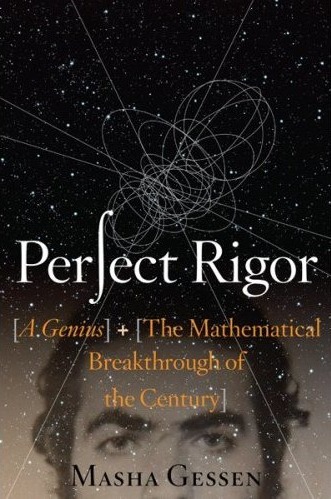Book review: Perfect Rigor
Within every field of human endeavor there is a collection of Holy Grail-like accomplishments; achievements so great that the attainment of any one of them would instantly guarantee a place in the history books. In Physics, for example, there is the discovery of the Higgs boson or room temperature superconductivity; Medicine has the cure for cancer and how to control the ageing process whereas Astronomy has dark matter and the discovery of extra-solar planets that are capable of supporting life.
Of course, mathematics is no exception and its Holy Grail set of exploits include problems such as the proof of the Riemann hypothesis, the Goldbach conjecture and the Collatz Problem. In the year 2000, The Clay Mathematics Institute chose seven of what it considered to be the most important unsolved problems in mathematics and offered $1 million for the solution of any one of them. These problems have since been referred to as The Millenium Prize Problems and many mathematicians thought that it would take several decades before even one was solved.
Just three years later, Grigori Perelman solved the first of them – The Poincaré conjecture. Stated over 100 years ago (in 1904 to be exact) by Henri Poincaré, the conjecture says that ‘Every simply connected closed three-manifold is homeomorphic to the three-sphere’. If, like me, you struggle to understand what that actually means then an alternative statement provided by Wolfram Alpha might help – ‘The three-sphere is the only type of bounded three-dimensional space possible that contains no holes.’ 99 years later, after generations of mathematicians tried and failed to prove this statement, Perelman published a proof on the Internet that has since been verified as correct by several teams of mathematicians. For this work he was awarded the Field’s Medal, one of the highest awards in mathematics, which he refused. According to Wolfram Alpha, Perelman also refused the $1 million from the Clay Institute but, as far as I know at least, he has not yet been offered it (can anyone shed light on this matter?).
Yep, Girgori Perelman is clearly rather different from most of us. Not only is he obviously one of the most gifted mathematicians in the world but he also sees awards such as the Field’s Medal very differently from many of us (after all, would YOU refuse such an award – I know I wouldn’t!). So, what kind of a man is he? How did he become so good at mathematics and why did he turn down such prestigious prizes?
In her book, Perfect Rigor, Masha Gessen attempts to answer these questions and more besides by writing a biography of Perelman. Starting before he was even born, Gessen tells Perelman’s story in the words of those who know him best – his friends, colleagues and competitors. Unfortunately, we never get to hear from the man himself because he cut off all communications with journalists before Gessen started researching the book. Despite this handicap, I think that she has done an admirable job and by the end of it I have a feeling that I understand Perelman and his motives a little better than before.
This is not a book about mathematics, it is a book about people who DO mathematics and gives an insight into the pressures, joys and politics that surround the subject along with what it was like to be a Jewish mathematician in Soviet-era Russia. What’s more, it is absolutely fascinating and I devoured it in just a few commutes to and from work. With hardly an equation in sight, you don’t need pencil and paper to follow the story (unlike many of the books I read on mathematics), all you need is a few hours and somewhere to relax.
The only problem I have with this book is that by the end of it I didn’t feel like I knew much more about the Poincaré conjecture itself despite getting to know its conqueror a whole lot more. Since I didn’t know much (Oh Ok…anything) about it to start with this is a bit of a shame. Near the end of writing this review, I took a look at what reviewers on Amazon.com thought of it and it seems that some of them are also disappointed at the mathematical content of the book and they come from a position of some authority on the subject. The best I can say is that if you want to learn about the Poincaré conjecture then this probably isn’t the book for you.
If, on the other hand, you want to learn more about the human being who slayed one of the most difficult mathematical problems of the millennium then I recommend this book wholeheartedly.


I have heard Perelman quoted in one source as saying he would turn down the money if authored, and in a different source that he would not decide until it was actually offered. It is possible both quotes are correct, but in any case the money has not been offered yet to find out what he’ll actually do.
The recent review of Gessen’s book in the NYT suggested Donal O’Shea’s book “The Poincaré Conjecture” for the math of the PC. I was lucky to stumble on to a copy yesterday at the original Powell’s (Hyde Park, Chicago), and it looks very good, with strong blurbs from Martin Gardner and Keith Devlin. O’Shea is himself a research mathematician at Mt. Holyoke. The guts of the PC is the branch of math called topology; O’Shea is a topologist who teaches undergraduates. I think this book might be the way to go if you want to learn about the actual mathematics.
Thanks David – I’ve added it to my Amazon wish list :)
Best Wishes,
Mike